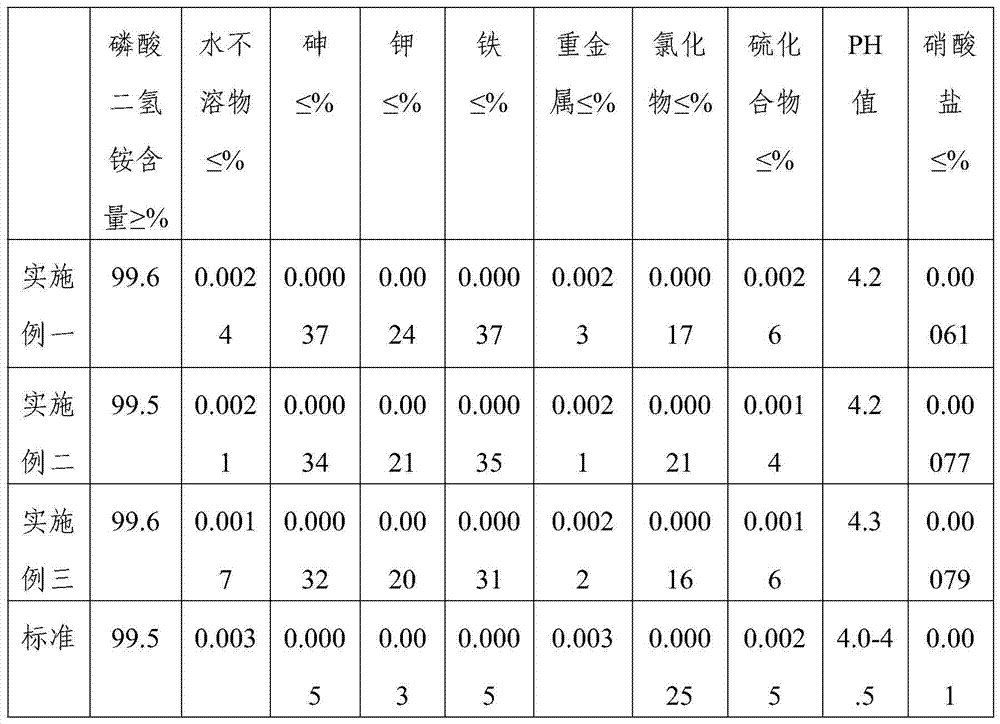A kind of preparation method of special fertilizer for cockscomb
A technology for special fertilizer and cockscomb, which is applied in the directions of phosphate fertilizer, application, fertilization device, etc., can solve the problems of low absorption rate of cockscomb, low output of cockscomb, waste of ammonium dihydrogen phosphate, etc., and achieves significant environmental protection value and significant economic value. , the effect of low production cost
- Summary
- Abstract
- Description
- Claims
- Application Information
AI Technical Summary
Problems solved by technology
Method used
Image
Examples
Embodiment 1
[0039] A method for preparing special fertilizer for celosia, comprising the following steps:
[0040] (1) Preparation of intermediate: first add phosphoric acid to the reaction kettle, and raise the temperature of phosphoric acid to 100°C, then add carbonamide to the reaction kettle to make it react with phosphoric acid, after 210 minutes of reaction, cool down the temperature Crystallize after reaching 15°C, and then centrifuge to obtain the intermediate, the molar ratio of phosphoric acid to carbonamide is 1.3:1;
[0041] (2) Preparation of ammonium dihydrogen phosphate: the intermediate obtained in step (1) is sent into the reactor, and ammonia is passed into the reactor, the mol ratio of ammonia to the intermediate is 1.2:1, and the reaction is controlled The time is 50min, the reaction temperature is 20°C, and the pH value is adjusted to 8.5. After the reaction is completed, the obtained slurry is added to the cooling crystallizer to circulate crystallization, and the fi...
Embodiment 2
[0046] A method for preparing special fertilizer for celosia, comprising the following steps:
[0047] (1) Preparation of intermediates: first add phosphoric acid to the reaction kettle, and raise the temperature of phosphoric acid to 130°C, then add carbonamide to the reaction kettle to make it react with phosphoric acid, after 190 minutes of reaction, cool down the temperature Crystallize after reaching 25°C, and then centrifuge to obtain the intermediate, the molar ratio of phosphoric acid to carbonamide is 1.4:1;
[0048] (2) Preparation of ammonium dihydrogen phosphate: the intermediate obtained in step (1) is sent into the reactor, and ammonia gas is passed into the reactor, the mol ratio of ammonia gas to the intermediate is 1.3:1, and the reaction is controlled The time is 50min, the reaction temperature is 30°C, and the pH value is adjusted to 9.5. After the reaction is completed, the obtained slurry is added to the cooling crystallizer to circulate crystallization, a...
Embodiment 3
[0053] 1. Preparation of intermediate: first add phosphoric acid into the reaction kettle, raise the temperature of phosphoric acid to 115°C, then add carbonamide to the reaction kettle to make it react with phosphoric acid, after 190 minutes of reaction, cool the temperature to After crystallization at 20°C, the intermediate was obtained by centrifugation, and the molar ratio of phosphoric acid to carbonamide was 1.4:1;
[0054] 2. Prepare ammonium dihydrogen phosphate: send the intermediate obtained in step (1) into the reactor, and feed ammonia gas into the reactor. The mol ratio of ammonia to the intermediate is 1.3:1, and the reaction time is controlled 60min, the reaction temperature is 25°C, and the pH value is adjusted to 9. After the reaction is completed, the obtained slurry is added to the cooling crystallizer to circulate crystallization, and the filtrate is detected and analyzed at the same time. When the mass ratio of nitrogen and phosphorus in the filtrate is 11 ...
PUM
 Login to View More
Login to View More Abstract
Description
Claims
Application Information
 Login to View More
Login to View More - R&D
- Intellectual Property
- Life Sciences
- Materials
- Tech Scout
- Unparalleled Data Quality
- Higher Quality Content
- 60% Fewer Hallucinations
Browse by: Latest US Patents, China's latest patents, Technical Efficacy Thesaurus, Application Domain, Technology Topic, Popular Technical Reports.
© 2025 PatSnap. All rights reserved.Legal|Privacy policy|Modern Slavery Act Transparency Statement|Sitemap|About US| Contact US: help@patsnap.com



